新概念英语第二册第十九课课后习题答案
- 格式:doc
- 大小:24.00 KB
- 文档页数:3
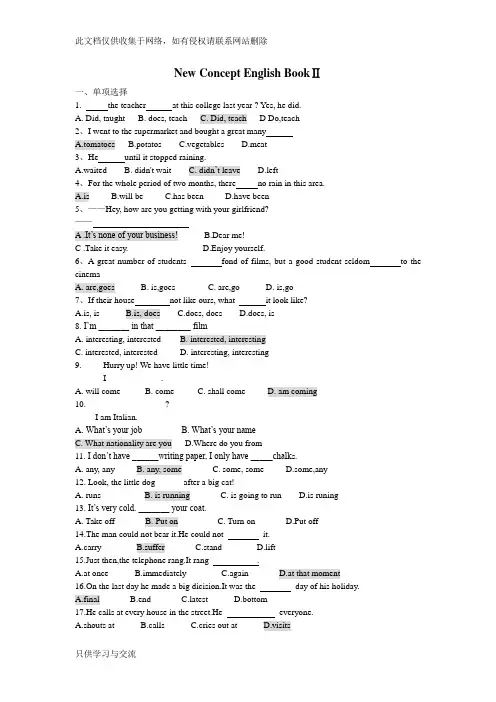
New Concept English BookⅡ一、单项选择1. the teacher at this college last year ? Yes, he did.A. Did, taughtB. does, teachC. Did, teach D Do,teach2、I went to the supermarket and bought a great manyA.tomatoesB.potatosC.vegetablesD.meat3、He until it stopped raining.A.waitedB. didn't waitC. didn’t leaveD.left4、For the whole period of two months, there no rain in this area.A.isB.will beC.has beenD.have been5、——Hey, how are you getting with your girlfriend?——A .It’s none of your business! B.Dear me!C .Take it easy. D.Enjoy yourself.6、A great number of students fond of films, but a good student seldom to the cinemaA. are,goesB. is,goesC. are,goD. is,go7、If their house not like ours, what it look like?A.is, isB.is, doesC.does, doesD.does, is8. I’m _______ in that ________ filmA. interesting, interestedB. interested, interestingC. interested, interestedD. interesting, interesting9. ------ Hurry up! We have little time!------ I ____________.A. will comeB. comeC. shall comeD. am coming10. -------_____________?-------I am Italian.A.What’s your jobB. What’s your nameC. What nationality are youD.Where do you from11. I don’t have ______writing paper, I only have _____chalk s.A. any, anyB. any, someC. some, someD.some,any12. Look, the little dog ______after a big cat!A. runsB. is runningC. is going to runD.is runing13. It’s very cold. _______ your coat.A. Take offB. Put onC. Turn onD.Put off14.The man could not bear it.He could not it.A.carryB.sufferC.standD.lift15.Just then,the telephone rang.It rang .A.at onceB.immediatelyC.againD.at that moment16.On the last day he made a big dicision.It was the day of his holiday.A.finalB.endtestD.bottom17.He calls at every house in the street.He everyone.A.shouts atB.callsC.cries out atD.visits18.The detectives were a valuable parcel of diamonds.A.expectingB.waitingC.expecting forD.expecting to19.The man is fond of gardens. .A.They like himB.They like to himC.He likes themD.He likes they20.How many times did the clock .A.hitB.beatC.knockD.strike二、Change the sentences with what or what a(n)21. It was very hot yesterday.What a hot day it was yesterday!22. It is so coldWhat cold weather it is!23. You have such an old bike.What an old bike you have!24. The book Tom is reading is very interesting.What an interesting book Tom is reading!25. We live in a very noisy place.What a noisy place we live in!三、用over, between, along, in front of, behind, 或across 等介词或介词短语填空26. A lot of birds are flying ___over____ the river.27. The teacher is standing _____in front of_______ the blackboard.28. I am running __along_____ the Great Wall(长城).29. They are swimming __across____ the river.30. I am sitting ____between_____my brother and my sister.四、用所给单词的适当形式填空:31、He is not very friendly (friend) towards newcomers(新来的).32、She slammed the telephone down angrily (angry).33、It was a sudden decision (decide)34、She works for that restaurant as a waitress (waiter)35、She is very excited (exciting) about winning the first prize.36、What have you been done lately (late).37、We are very pleased (please) with our new house.38、She rarely ( rare) visited her aunt.39、“W hat do you want?”She asked rudely (rude)40、I had a long conversation (converse) with her the other day(不久前一天).五、词组互译41、none of your business 与你无关42、破坏我的假日spoil my holiday43、在回家的路上on the way back home44、by the way 顺便说一下45、今天就到此为止let’s call it today六、阅读理解How many different languages are spoken in the world today? There are about 5,000 different languages. Nearly 900 languages are spoken in India.Chinese is the language spoken by the biggest number of people in the world.But the most widely spoken language in the world is English.300,000,000 people speak English as a first language.Nearly twice as many--about 650 million people speak it as a foreign language.How many words are there in the English language? There are about 490,000.Also,there are about 300,000 words used in science(科技).There are more words in English than in any other language.But most people use no more than 60,000 words.Children,leaving school at the age of 1 6,know about 1 5,000 words.1.The Chinese language is spoken ________.A.in most countries in the worldB.in 600 countriesC.by the biggest number of people in the world2.About 650 million people speak English as________.A.a first languageB.well as the native speakersC.a second language3.Only ________ English words are used by most people.A.six thousandB.three hundred thousandC.sixty thousand4.Children ________ know about 15,000 words.A.who start school at the age of 6B.who study at schoolC.who finish school at sixteen5.Which of the fol lowing is true’A.There are no more than 5,000 different languages in the world.B.English is the most widely-used language.C.The Indian people speak 800 languages.One day a poor student was walking through a town. He had not had anything to eat for several days and he was very hungry. And when he saw a man selling homemade hamburgers, he let out a scream and fell to the ground. When the surprised seller asked the student what the matter was, the student answered, “I don’t like hamburgers. In fact, I hat e them. Whenever I see them, I feel ill and can’t eat.”The hamburger seller then thought that he would play a joke on the student. He put ten hamburgers in the comer of a room and then locked the student in it. After a short time, the hamburger seller opened the door of the room. He was surprised to find that the student had eaten all the hamburgers. The student explained. “For some strange reason, I suddenly decided that I liked hamburgers.”The hamburger seller was angry that the student had fooled him. He asked what other things he did not like to eat. “Oh, I like everything, ”answered the student, “Except at the moment Iwould hate to drink two cups of good strong tea!”6. The student was very hungry because .A.he was illB.he had not eaten for a long timeC.he saw the hamburgers7. The hamburger seller wanted to the student.A.help B,pull up C.play a joke on8. The hamburger seller was surprised to find the student had eaten hamburgers.A.tenB.fiveC.two9. In fact, .A.the seller wanted to sell some hamburgers to the studentB.the student really hated hamburgersC.the student fooled the hamburger seller10. The student .A.wanted some teaB.didn’t like teaC.hated strong teaGeorge works in a factory. He was born in a very poor family and was in school for only four years. He has to do the hard work, but he is paid less because of this. He likes to watch football matches very much and spends much time on it.One evening there was a big football match on a playground. He borrowed some money from his friend and hurried there. There were a lot of people there. And all the tickets were sold out. He was sorry for it. He saw a pole(电线杆)outside the playground and climbed it up quickly. A policeman came and said. “It’s dangerous to stay on it! Come down!”“Wait a minute, please!” George said and just at that moment the policeman heard cheers in the playground and asked in a hurry. “Which team has kicked a goal?” “Ours!” “Wonder ful!You can stay there. But take care!” the policeman said happily and left. When the match would soon be over, he came back again and asked,“Who’s won?” “Theirs, 3-2.” “Come down, ”the policeman said a ngrily, “Such a match isn’t worth watching!”George had to come down. But soon they heard cheers again. The policeman said in a hurry, “Climb up quickly and see who’s kicked a goal!”11. George is paid less because he didn’t learn much when he was young.A.RightB.WrongC.Doesn’t say12. George climbed up the pole because he hoped to save some money.A.RightB.WrongC.Doesn’t say13. The policeman soon changed his mind at the first time because he thought it was safe for George to be on the pole.A.RightB.WrongC.Doesn’t say14. The policeman became angry when he heard their team had lost the game.A.RightB.WrongC.Doesn’t say15. Both George and the policeman are football fans.A.RightB.WrongC.Doesn’t say七、完型填空Mrs. Williams loved flowers and had a small __1__ beautiful garden.In the summer,her roses were always the __2__ in her street.0ne summer afternoon her __3__ rang,and when she went to the front door,she saw a small boy outside.He was about seven years old.and was holding a big bunch(束)of beautiful roses in his hand.“I __4__ roses, ” he said.“Do you want any? They are quite cheap.One shilling __5__ a big bunch.They are fresh(新鲜).I __6__ them this afternoon.” ’“My boy,” Mrs. Williams answered,“I pick __7__ whenever I want,and don’t pay __8__ for them,because I have lots in my garden.”“Oh,no,you haven’t,”said the small boy.“There __9__ any roses in your garden ----__10__ they are here in my hand!”1.A and B or C but2.A better B worst C best3.A bell B telephone C door4.A sell B sold C am selling5.A for B by C in6.A brought B took C picked7.A flowers B roses C a flower8.A nothing B something C anything9.A haven't B won’t C aren’t10.A so B and C because。
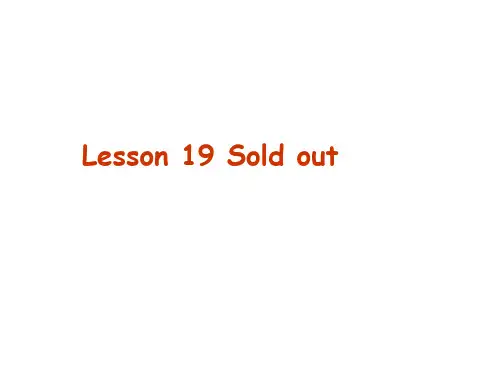
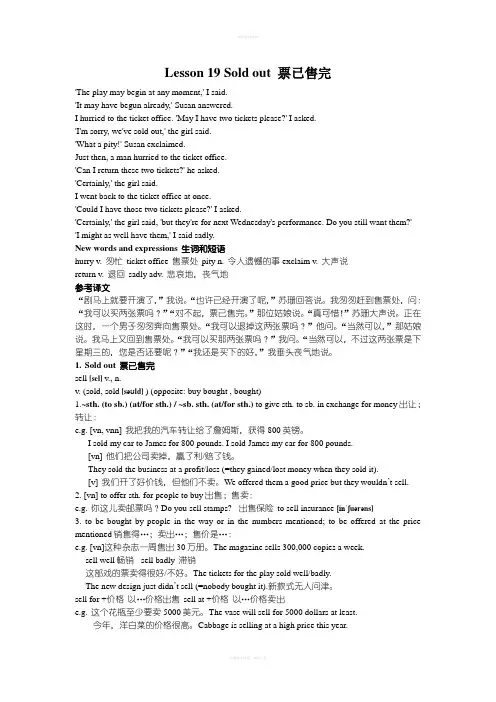
Lesson 19 Sold out 票已售完'The play may begin at any moment,' I said.'It may have begun already,' Susan answered.I hurried to the ticket office. 'May I have two tickets please?' I asked.'I'm sorry, we've sold out,' the girl said.'What a pity!' Susan exclaimed.Just then, a man hurried to the ticket office.'Can I return these two tickets?' he asked.'Certainly,' the girl said.I went back to the ticket office at once.'Could I have those two tickets please?' I asked.'Certainly,' the girl said, 'but they're for next Wednesday's performance. Do you still want them?''I might as well have them,' I said sadly.New words and expressions 生词和短语hurry v. 匆忙ticket office 售票处pity n. 令人遗憾的事exclaim v. 大声说return v. 退回sadly adv. 悲哀地,丧气地参考译文“剧马上就要开演了,”我说。
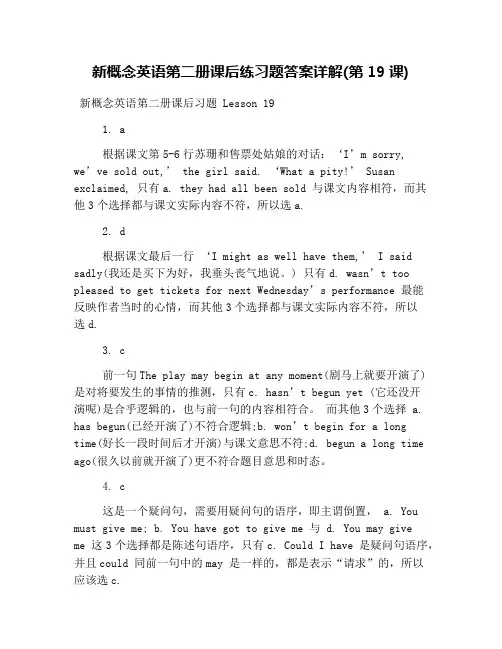
新概念英语第二册课后练习题答案详解(第19课)新概念英语第二册课后习题 Lesson 191. a根据课文第5-6行苏珊和售票处姑娘的对话:‘I’m sorry, we’ve sold out,’ the girl said. ‘What a pity!’ Susan exclaimed, 只有a. they had all been sold 与课文内容相符,而其他3个选择都与课文实际内容不符,所以选a.2. d根据课文最后一行‘I might as well have them,’ I said sadly(我还是买下为好,我垂头丧气地说。
) 只有d. wasn’t too pleased to get tickets for next Wednesday’s performance 最能反映作者当时的心情,而其他3个选择都与课文实际内容不符,所以选d.3. c前一句The play may begin at any moment(剧马上就要开演了)是对将要发生的事情的推测,只有c. hasn’t begun yet (它还没开演呢)是合乎逻辑的,也与前一句的内容相符合。
而其他3个选择 a. has begun(已经开演了)不符合逻辑;b. won’t begin for a longtime(好长一段时间后才开演)与课文意思不符;d. begun a long time ago(很久以前就开演了)更不符合题目意思和时态。
4. c这是一个疑问句,需要用疑问句的语序,即主谓倒置, a. You must give me; b. You have got to give me 与 d. You may giveme 这3个选择都是陈述句语序,只有c. Could I have 是疑问句语序,并且could 同前一句中的may 是一样的,都是表示“请求”的,所以应该选c.动词let 后面只能跟不带to 的动词不定式才合乎语法即let sb. do sth.. a. having 是现在分词,不符合语法; b. to have 中动词不定式不应该带to, 也不合乎语法;c. had 是动词的过去式,也不符合语法; 只有d. have 是不带to 的动词不定式,所以应该选d.6. b这个句子的时间状语 next Wednesday 下星期三,班是表示将来的时间,所以需要用将来时态。
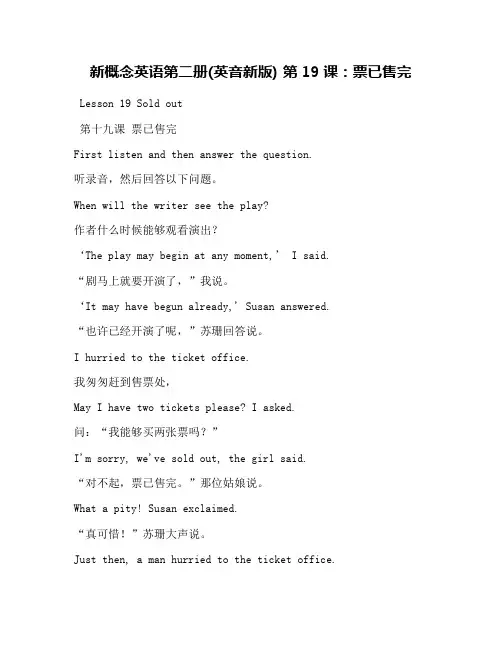
新概念英语第二册(英音新版) 第19课:票已售完 Lesson 19 Sold out第十九课票已售完First listen and then answer the question.听录音,然后回答以下问题。
When will the writer see the play?作者什么时候能够观看演出?‘The play may begin at any moment,’ I said.“剧马上就要开演了,”我说。
‘It may have begun already,' Susan answered.“也许已经开演了呢,”苏珊回答说。
I hurried to the ticket office.我匆匆赶到售票处,May I have two tickets please? I asked.问:“我能够买两张票吗?”I'm sorry, we've sold out, the girl said.“对不起,票已售完。
”那位姑娘说。
What a pity! Susan exclaimed.“真可惜!”苏珊大声说。
Just then, a man hurried to the ticket office.正在这时,一个男子匆匆奔向售票处。
Can I return these two tickets? he asked.“我能够退掉这两张票吗?”他问。
Certainly, the girl said.“当然能够,”那姑娘说。
I went back to the ticket office at once.我马上又回到售票处。
Could I have those two tickets please? I asked.“我能够买那两张票吗?”我问。
‘Certainly,' the girl said,‘but they're for next Wednesday's performance.’“当然能够,不过这两张票是下星期三的。
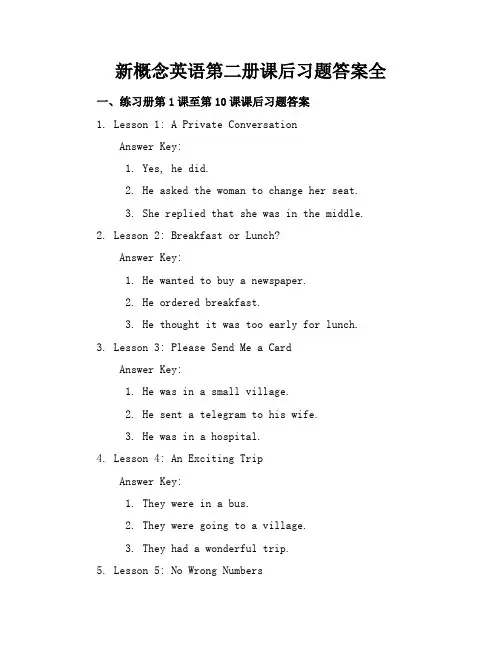
新概念英语第二册课后习题答案全一、练习册第1课至第10课课后习题答案1. Lesson 1: A Private ConversationAnswer Key:1. Yes, he did.2. He asked the woman to change her seat.3. She replied that she was in the middle.2. Lesson 2: Breakfast or Lunch?Answer Key:1. He wanted to buy a newspaper.2. He ordered breakfast.3. He thought it was too early for lunch.3. Lesson 3: Please Send Me a CardAnswer Key:1. He was in a small village.2. He sent a telegram to his wife.3. He was in a hospital.4. Lesson 4: An Exciting TripAnswer Key:1. They were in a bus.2. They were going to a village.3. They had a wonderful trip.5. Lesson 5: No Wrong Numbers1. He was waiting for a phone call.2. He was waiting for his uncle.3. He received a wrong number.6. Lesson 6: Percy ButtonsAnswer Key:1. He was an old man.2. He collected old coins.3. He had a valuable coin.7. Lesson 7: Too LateAnswer Key:1. They were late for the meeting.2. They missed the train.3. They had to take a taxi.8. Lesson 8: The Best and the WorstAnswer Key:1. He was a good swimmer.2. He was the best swimmer in the pool.3. He was the worst swimmer in the pool. Answer Key:1. He was a famous actor.2. He was in a small town.3. He was recognized a young man.10. Lesson 10: Not for Jazz1. He was a famous musician.2. He played the piano.3. He was not for jazz.二、练习册第11课至第20课课后习题答案11. Lesson 11: One Good Turn Deserves Another Answer Key:1. He helped an old lady.2. She helped him find his way.3. He was grateful to her.12. Lesson 12: Ask Me No QuestionsAnswer Key:1. He was a writer.2. He wrote a book about his adventures.3. He was very modest.13. Lesson 13: Going on HolidayAnswer Key:1. They were going on holiday.2. They were going to the seaside.3. They had a wonderful time.14. Lesson 14: Do You Speak English?Answer Key:1. He was a tourist.2. He was in a foreign country.3. He spoke English.15. Lesson 15: Good NewsAnswer Key:1. He was a doctor.2. He had good news for his patient.3. The patient was cured.16. Lesson 16: A Polite RequestAnswer Key:1. He was a customer.2. He wanted to buy a new car.3. He asked the salesman for help.17. Lesson 17: Across the ChannelAnswer Key:1. He was a swimmer.2. He swam across the English Channel.3. He was very tired.18. Lesson 18: Once a WeekAnswer Key:1. He was a doctor.2. He visited his patients once a week.3. He was very busy.19. Lesson 19: Sold OutAnswer Key:1. He was a customer.2. He wanted to buy a ticket.3. The ticket was sold out.20. Lesson 20: One Man in a BoatAnswer Key:1. He was a fisherman.2. He was alone in a boat.3. He caught a lot of fish.。

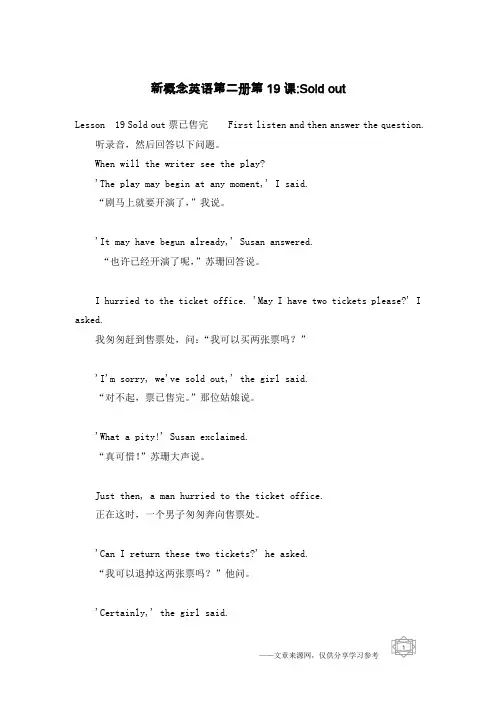
新概念英语第二册第19课:Sold outLesson 19 Sold out票已售完First listen and then answer the question.听录音,然后回答以下问题。
When will the writer see the play?'The play may begin at any moment,' I said.“剧马上就要开演了,”我说。
'It may have begun already,' Susan answered.“也许已经开演了呢,”苏珊回答说。
I hurried to the ticket office. 'May I have two tickets please?' I asked.我匆匆赶到售票处,问:“我可以买两张票吗?”'I'm sorry, we've sold out,' the girl said.“对不起,票已售完。
”那位姑娘说。
'What a pity!' Susan exclaimed.“真可惜!”苏珊大声说。
Just then, a man hurried to the ticket office.正在这时,一个男子匆匆奔向售票处。
'Can I return these two tickets?' he asked.“我可以退掉这两张票吗?”他问。
'Certainly,' the girl said.“当然可以,”那姑娘说。
I went back to the ticket office at once.我马上又回到售票处。
'Could I have those two tickets please?' I asked.“我可以买那两张票吗?”我问。
'Certainly,' the girl said, 'but they're for next Wednesday's performance. Do you still want them?'“当然可以,不过这两张票是下星期三的,您是否还要呢?”'I might as well have them,' I said sadly.“我还是买下的好,”我垂头丧气地说。
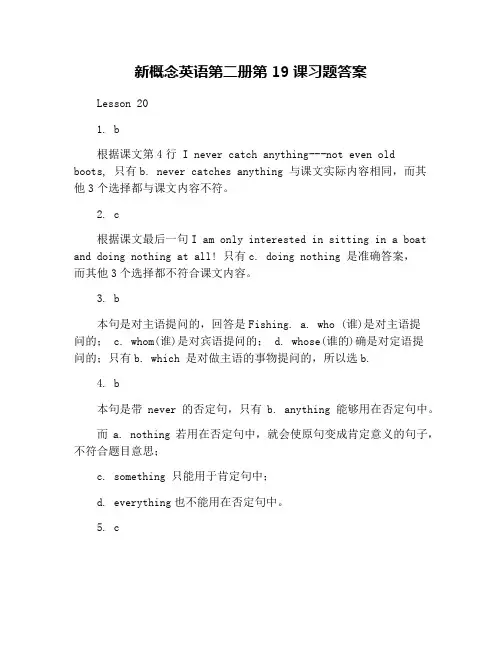
新概念英语第二册第19课习题答案Lesson 201. b根据课文第4行 I never catch anything---not even old boots, 只有b. never catches anything 与课文实际内容相同,而其他3个选择都与课文内容不符。
2. c根据课文最后一句I am only interested in sitting in a boat and doing nothing at all! 只有c. doing nothing 是准确答案,而其他3个选择都不符合课文内容。
3. b本句是对主语提问的,回答是Fishing. a. who (谁)是对主语提问的; c. whom(谁)是对宾语提问的; d. whose(谁的)确是对定语提问的;只有b. which 是对做主语的事物提问的,所以选b.4. b本句是带never的否定句,只有b. anything 能够用在否定句中。
而a. nothing若用在否定句中,就会使原句变成肯定意义的句子,不符合题目意思;c. something 只能用于肯定句中;d. everything也不能用在否定句中。
5. c前面句子 I am even less lucky 中的 less(不及)是表示否定意义的比较级,只有c. not so 是表示否定意义的,而其他3个选择都没有否定的意思.6. b只有b. an empty bag 最符合语法。
而其他3个选择都有语法错误。
a. a empty bag 中empty 是以元音开头的,前面不能用a 而应该用an; c. empty bag 中 bag 是可数名词,需要用an 来修饰; d. one empty bag 不符合习惯用法,单数可数名词前通常用不定冠词a或an 修饰,除非表示强调才用one 修饰。
所以应该选b.7. c只有c. all 才能使这个句子同前一句I am only interested in doing nothing.的含义相符合,all等于the things that ,能够代替doing nothing. 而其他3个选择中a. only 和d. the only 不符合语法,b. the one 不符合题目意思,不能完全表达清楚。
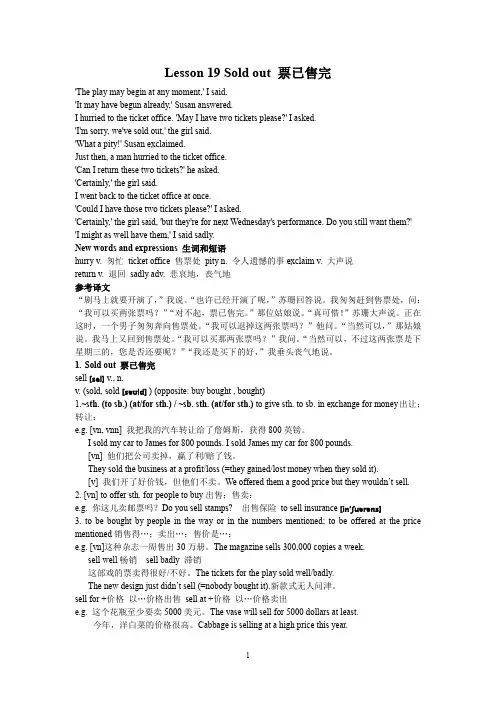
Lesson 19 Sold out 票已售完'The play may begin at any moment,' I said.'It may have begun already,' Susan answered.I hurried to the ticket office. 'May I have two tickets please?' I asked.'I'm sorry, we've sold out,' the girl said.'What a pity!' Susan exclaimed.Just then, a man hurried to the ticket office.'Can I return these two tickets?' he asked.'Certainly,' the girl said.I went back to the ticket office at once.'Could I have those two tickets please?' I asked.'Certainly,' the girl said, 'but they're for next Wednesday's performance. Do you still want them?''I might as well have them,' I said sadly.New words and expressions 生词和短语hurry v. 匆忙ticket office 售票处pity n. 令人遗憾的事exclaim v. 大声说return v. 退回sadly adv. 悲哀地,丧气地参考译文“剧马上就要开演了,”我说。
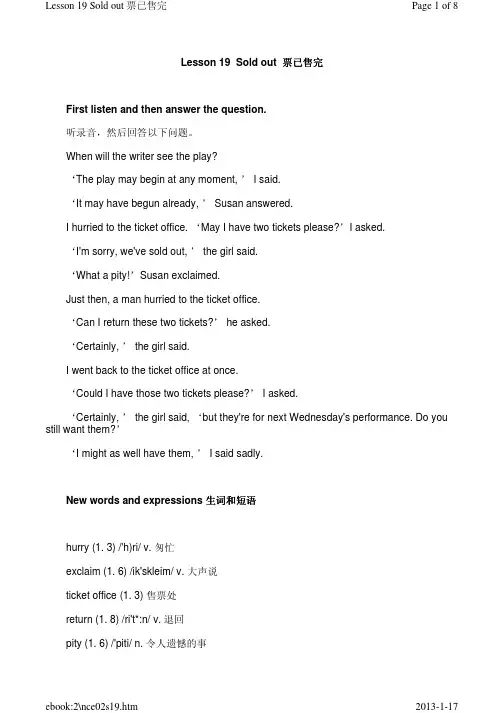
票已售完Lesson 19 Sold out 票已售完First listen and then answer the question.听录音,然后回答以下问题。
When will the writer see the play?‘The play may begin at any moment, ’ I said.‘It may have begun already, ’ Susan answered.I hurried to the ticket office. ‘May I have two tickets please?’I asked.‘I'm sorry, we've sold out, ’ the girl said.‘What a pity!’Susan exclaimed.Just then, a man hurried to the ticket office.‘Can I return these two tickets?’ he asked.‘Certainly, ’ the girl said.I went back to the ticket office at once.‘Could I have those two tickets please?’ I asked.‘Certainly, ’ the girl said, ‘but they're for next Wednesday's performance. Do you still want them?’‘I might as well have them, ’ I said sadly.和短语语New words and expressions 生词和短hurry (1. 3) /'h)ri/ v. 匆忙exclaim (1. 6) /ik'skleim/ v. 大声说ticket office (1. 3) 售票处return (1. 8) /ri't*:n/ v. 退回pity (1. 6) /'piti/ n. 令人遗憾的事sadly (1. 13) /'s$dli/ adv. 悲哀地,丧气地文注释释Notes on the text 课文注1 The play may begin at any moment,剧马上就要开演了。
Unit 1:Lesson 01 A Private ConversationLesson 02 Breakfast or LunchLesson 03 Please Send Me a CardLesson 04 An Exciting TripLesson 05 No Wrong NumbersLesson 06 Percy ButtonsLesson 07 Too LateLesson 08 The Best and WorstLesson 09 A Cold WelcomeLesson 10 Not for JazzLesson 11 One Return Deserves AnotherLesson 12 Goodbye and Good LuckLesson 13 The Greenwood BoysLesson 14 Do You Speak EnglishLesson 15 Good NewsLesson 16 A Polite RequestLesson 17 Always YoungLesson 18 It Often Does ThisLesson 19 Sold OutLesson 20 One Man in a BoatLesson 21 Mad or NotLesson 22 A Glass EnvelopLesson 23 A New HouseLesson 24 It Could Be WorseUnit 2:Lesson 25 Do the English Speak EnglishLesson 26 The Best Art CritistLesson 27 A Wet NightLesson 28 No ParkingLesson 29 TaxiLesson 30 Football or PoloLesson 31 Success StoryLesson 32 Shopping Made EasyLesson 33 Out of the DarknessLesson 34 Quick WorkLesson 35 Stop ThiefLesson 36 Across ChannelLesson 37 Olympic GamesLesson 38 Everything Except the Weather Lesson 39 Am I AlrightLesson 40 Food and TalkLesson 41 Do You Call That a HatLesson 42 Not Very MusicalLesson 43 Over the South PoleLesson 44 Through the ForestLesson 45 A Clear ConscienceLesson 46 Expensive and UncomfortableLesson 47 A Thirsty GhostLesson 48 Did You Want to Tell Me Something Unit 3:Lesson 49 The End of the DreamLesson 50 Taken for a RideLesson 51 Reward for VirtueLesson 52 A Pretty CarpetLesson 53 Hot SnakeLesson 54 Stick FingersLesson 55 Not a Gold MineLesson 56 Faster Than SoundLesson 57 Can I Help You, MadamLesson 58 A Blessing in the SkyLesson 59 In or OutLesson 60 The FutureLesson 61 Trouble with the HarborLesson 62 After the FireLesson 63 She Was Not AmusedLesson 64 The Channel TunnelLesson 65 Jumbo versus the PoliceLesson 66 Sweetest HoneyLesson 67 VolcanosLesson 68 PersistentLesson 69 But not MurderLesson 70 Red, the DangerLesson 71 A Famous ClockLesson 72 A Car Called BluebirdUnit 4:Lesson 73 The Record HolderLesson 74 Out of the LimelightLesson 75 SOSLesson 76 April Fools DayLesson 77 A Successful OperationLesson 78 The Last OneLesson 79 By AirLesson 80 The Crystal PalaceLesson 81 EscapeLesson 82 Monster of FishLesson 83 Off the ElectionsLesson 84 On StrikeLesson 85 Never too Old to LearnLesson 86 Out of ControlLesson 87 A Perfect AlibiLesson 88 Trapt in the MineLesson 89 A Slip of the TongueLesson 90 Whats the SupperLesson 91 Three Men in a BasketLesson 92 Asking for TroubleLesson 93 A Noble GiftLesson 94 Future ChampionsLesson 95 A FantasyLesson 96 The Dead Return摘要写作参考答案(Key to Summary writing)Unit 1Lesson 1 A Private ConversationThe writer went to the theatre last week.He did't enjoy the play.A young man and a young woman were sitting behind him.They were talking loudly.The writer couldn't hear the actors.He turned round.He said he couldn't hear a word.The young man said,'This is a private conversation!'.(53 words)Lesson 2 Breakfast or LunchThe writer always gets up late on Sundays.He got up late last Sunday.His aunt telephoned then.She had just arrived by train.She was coming to see him.He said,'I am still having breakfast'.His aunt was surprised.It was one o'clock.(45 words)Lesson 3 Please Send Me a CardPostcards always spoil the writer's holidays.He spent his holiday in Italy last summer.He tought about postcards every day.He didn't send any cards to his friends.He bought thirty-seven cards on the last day.He staied at home all day.He didn't write any cards.(47 words)Lesson 4 An Exciting TripThe writer has just received a letter from his brother,Tim.Tim is an engineer.He has been in Australia for six months.He has already visited many places.He is in Alice Springs now.Tim has never been abroad before.He is enjoying his trip very much.(48 words)Lesson 5 No Wrong NumbersMr.Scott has opened his second garage in Pinhurst.His firstgarage is in Silbury.Silbure is five miles away from Pinhurst.Mr.Scott can't get a telephone for his new garage.He has just bought twelve pigeons.They carry messages from one garage to the other in three minutes.(48 words)Lesson 6 Percy ButtonsThe writer has just moved to a house in Bridge Street.A beggar knocked at her door yesterday.He sang songs.The writer gave him a meal and a glass of beer in return for this.The beggar's name is Percy Buttons.He calls at every house once a month.(50 words)Lesson 7 Too LateDetectives were waiting at the airport all morning.They were expecting a valuable parcel of diamonds from South Africa.Two men took the parcel of the plane.Two detectives opened it.The parcel was full of stones and sand.(39 words)Lesson 8 The Best and WorstJoe Sanders has the best garden in town.He wins 'The Nicest Garden Competition'each year.Bill has a fine garden.Joe's is better.The writer's garden is terrible.He always win a little prize for the competition.(37 words)Lesson 9 A Cold WelcomeWe went to the Town Hall on New Year's Eve.There were a lot of people there.The Town Hall clock will strike twelve in twenty minutes.At five to twelve,it stopped.It refused to welcome the New Year.The crowd began to laugh and sing.(46 words)Lesson 10 Not for JazzWe own an old clavichord.It was made in 1681.My grandfather bought the instrument many years ago.A visitor damaged it recently.She tried to play jazz on it.She broke two of the strings.My father's friend is repairing it now.(45 words)Lesson 11 One Return Deserves AnotherI was having dinner at a restaurant.I see Tony Steele aftera while.He always borrows money from his friends.Tony sat at my table.I asked him to lend me twenty pounds.He gave me the money at once.He wanted me to pay for his dinner.(49 words)Lesson 12 Goodbye and Good LuckWe'll meet Captain Charles Alison at Portsmouth Harbour eary tomorrow moring.He will be in his small boat,Topsail.He will leave at eight o'clock.We'll say goodbye to him.He will take part in an importantrace across the Atlantic.(40 words)Lesson 13 The Greenwood BoysThe Greenwood Boys are singers.They will be coming here tomorrow.Most of the young people will be meeting them at the station.They will gave five peiformances.The police will be trying to keep order as usual.(38 words)Lesson 14 Do You Speak EnglishThe writer gave a lift to a young man in the south of France last year.They greated each other in French.The writer doesn't speak any French.They sat in silence.The young man said,'Do you speak English?' at the end of the journey.He was English himself.(49 words)Lesson 15 Good NewsMr.Harmsworth wanted see me.I felt nervous.I went into his office.He said business was very bad.The firm couldn't pay such large salaries.Twenty people had already left.He didn't ask me to leave.He offered me an extra thousand pounds a year!(47 words)Lesson 16 A Polite RequestTraffic police usually give you a ticket if you park your car in the wrong place.The writer found a polite note on his car in Sweden.The traffic policeman wanted him to pay attention to their street sighs.Everyone can't fail to obey a request like this.(48 words)Lesson 17 Always YoungMy aunt Jennifer is an actress.She is over thirty years old.She often appears on the stage as a young girl.Jennifer will act the part of a girl of seventeen in a new play soon.She never tells anyone how old she really is.(46 words)Lesson 18 It Often Does ThisThe writer had lunch at a village pub.She couldn't find her bag after her meal.She couldn't pay the bill.The landlord soon found it for her.His dog had taken it into the garden.(36 words)Lesson 19 Sold OutThe play was going to begin at any moment.I asked for two tickets.There were none left.Susan and I were disappointted.A man hurried to the ticket office just then.He returned two tickets.They were for next Wednesday's performance.I boughtthem.(45 words)Lesson 20 One Man in a BoatFishing is the writer's favourite sport.Some unlucky fisherman catch old boots and rubbish.The writer isn't not so lucky.He never catches anything.He isn't really interested in fishing.He is only interested in sitting in a boat and doing nothing at all.(44 words)Lesson 21 Mad or NotThe writer is slowly going mad.He lives near an airport.Passing planes can be heard night and day.Most of his neighbours have left their homes.He has been offered money to leave.He determined to stay here.Everyone says he must be mad.They are probably right.(49 words)Lesson 22 A Glass EnvelopJane crossed the Channel last year.She threw a bottle into the sea.It contains a piece of paper with her name and address on it.She received a letter from a girl in Holland ten months later.They write to each other regularly now.They send their letters by post.(50 words)Lesson 23 A New HouseMy sister will come to England next year.If she comes,she will get a surprise.I have a new house in the country.I have invited my sister to star with me.It is a very modern house.It has get many large rooms and a lovely garden.(48 words)Lesson 24 It Could Be WorseI had just lost fifty pounds.I felt very upset.I told the manager about it.He couldn't do anything.He began complain about this wicked world.A girl came in with the money just then.She had found it outside my room.There is still some honesty in this world.(51 words)Unit 2Lesson 25 Do the English Speak EnglishI arrived at a railway station in London and asked a porter the way to my hotel,but he couldn’t understand me. He understood me at last but I couldn’t understand his answer. My teacher never spoke English like that. The porter said I shall learn English soon.. Each person speaks a different language inEngland. They understand each other but I don’t understand them.(67 words)Lesson 26 The Best Art CritistThe writer studies art and paints a lot of pictures. Many people don’t really understand modern art. Paintings don’t always have a meaning. They are something pretty patterns. Young children not only appreciate modern paintings better than others,but noticed more also. The writer’s young sister went into his room yesterday and examined his new picture. He had hung it upside down and she noticed this immediately.(67 words)Lesson 27 A Wet NightThe boys put up their tent in the middle of a flied and cooked over an open fire. They told stories and sang songs after their meal but it began to rain so they crept into their tent. The boys woke up in the middle of the night. The tent was full of water so they rushed outside. A stream had formed in the field and flowed right under their tent.(68 words)Lesson 28 No ParkingJasper White believes in ancient myths. Car owners always park their cars outside his gate so he has put up ‘No Parking’ signs but they haven’t paid any attention to them. He has put an ugly stone head over the gate. It is Medusa’s head. He wants her to turn cars and their owners to stone but she hasn’t done so yet.(62 words)Lesson 29 TaxiCaptain Ben Fawcett has bought a small Swiss aeroplane and uses it as a taxi. It is called a ‘Pilatus Porter’ . It can not only carry seven passengers, but can land anywhere also. Captain Fawcett has taken passengers to many strange places. He refused to fly a businessman to Rockall. The journey was too dangerous.(56 words)Lesson 30 Football or poloThe writer sat by the river last Sunday. Some children were playing games nearby. One of the children kicked a ball hard and it went towards a passing boat. The man in the boat neither saw the ball nor heard people shouting. The ball hit the man and the children ran away. However, the man was not angry and he threw the ball back to the bank. (67 words)Lesson 31 Success story?Frank Hawkins was telling the writer about his experiences as a young man.Frank used to work in a small shop as a boy.He used to repair bicycles there.He bought his own shop in 1958 and he made spare parts for aeroplanes in his twenties.He employed a lot of people in a few years.His wife came into the room after a while.She wanted him to repair their grandson's bicycle.(68 words)Lesson 32 Shopping made easyA detective watched a well-dressed woman in a large store one Monday.She bought a few small articles and she chose an expensive dress.The assistant wrapped it up for her and the woman took it with her.She did not pay for it,so the detective arrested her. The assistant was her daughter. She gave her mother a free dress once a week.(60 words)Lesson 33 Out of the darknessThe girl set out from the coast one afternoon and was caught in a storm.Her boat struck a rock,so she jumped into the sea.She swam eight miles that night.She reached the shore early next morning.She had seen a light high up on the cilffs and she cllimbed up.She found herself in hospital a day later.(55 words)Lesson 34 Quick workDan Robinson was worried.He had received a letter from the local police.Yesterday he went to the station.He is not worried any more.The police have found his bicycle.Dan was not only surprised but amused as well.His bicycle was stolen twenty years ago.He was fifteen then.(44 words)Lesson 35 Stop thief!Roy is finding his new job as a bus driver exciting.He saw two thieves in Catford Street recently.They were running out of a shop and Roy drove his bus straight at them,so they dropped the stolen money and got into a car.Roy drove his bus into the back of their car then and damaged it.Afte this he telephoned the police.Both men were arrested later. (64 words)Lesson 36 Across the ChannelDebbie Hart is going to swim across the English Channel tomorrow.She is eleven and she is a strong swimmer.Debbie hasbeen trained by her father.He will follow her in a small boat.Debbie's mother will be waiting on the English coast.She swam the Channel herself when she was a girl.(49 words)Lesson 37 The Olympic GamesThe Olympic Games will be held in our country in four years' time,so the government will be putting up new buildings just outside the capital.Kurt Gunter has designed the buildings and workers will have completed the new stadium by the end of next year.The Games will be held in this country for the first time and we are looking forward to them. (62 words)Lesson 38 Everything except the weatherThe writer's friend,Harrison,had spent many years in the Mediterranean,but he wanted to retire in England so he bought a house in the country.The summer that year was very bad and he complained about the weather.In the end Harrison not only sold the house but also left the country.(48 words)Lesson 39 Am I all right?lington refused to tell his patient,Mr.John Gilbert,whether his operation had been successful.The next day the patient telephoned lington and inquired about a certain patient,Mr.John Gilbert.The doctor answered a number of questions about the patient and then asked whether the caller was a relative.The caller then told him who he was.(50 words)Lesson 40 Food and talkThe writer sat beside Mrs. Rumbold at the dinner party.He tried to make comversation, but she was busy eating.He talked about the new play at 'The Globe' and about the holidays.She answered his questions briefly.Then he asked her if she was enjoying her dinner and she answered that if he have eaten morn and talked less, they would both have a good dinner.(63 words)Lesson 41 Do You Call That a HatThe wirter's wife was trying on a hat and he didn't like it. He sat down and waited for her.Then they began arguing again.He had bought a terrible tie the day before but his wife didn’t like it. He said,‘A man can never have too many ties.' His wife used exactly the same argument and she bought the hat. It looked like a lighthouse.(67 words)Lesson 42 Not Very MusicalWe watched a snake charmer in a square in Old Delhi. He had a long pipe and two large baskets. He played a tune and the snake in one of the baskets rose to follow the movements of the pipe. Then the snake charmer played modern tunes but the snake continued to dance slowly. It didn't know the difference between Indian music and jazz.(64 words)Lesson 43 Over the South PoleIn 1929,the American explorer ,R.E.Byrd became the first man to fly over the South Pole. He took a lot of photographs during the flight but then ran into difficulties. His plane couldn't get over the mountains so he orded his men to throw out two heavy food sacks. The plane then flew over the mountains and continued without further trouble.(63 words)Lesson 44 Through the ForestTwo men tried to steal Mrs.Sterling's handbag. She was having a picnic at the time. They took the bag after a struggle and ran through the trees. She ran after them and caught up with them. The men had sat down and were going through the contents of the bag. Mrs.Sterling ran straight at them so they dropped the bag and ran away.(66 words)Lesson 45 A Clear ConscienceThe local buther,Sam Benton,was taking his savings to the post office but he lost his wallet. Sam not only received half his money three months later,but received a note as well.The note said:‘A thief,yes,but only 50 per cent a thief!'The thief included a note every time he sent Sam more money. The last note said: ‘I am 100 per cent honest now!’(68 words)Lesson 46 Expensive and UncomfortableThe plane from London arrived at Sydney airport and workers unloaded a number of wooden boxes. They contained clothing. One of the boxes was extremely heavy so a worker opened it. He found a man on top of a pile of woolen goods. The man was arrested. He had travelled in the box from London. He had to pay 3,500 pounds. An ordinary tickets costs 2,000 pounds.(65 words)Lesson 47 A Thirsty GhostMr. Ian Thompson bought a public house recently but it is haunted,so he is going to sale it. There was a strange noise in the bar one night and the room was in disorder next morning. Mr.Thompson found five empty whisky bottles. He doesn’t believe that some villagers broke into the bar and had a drink. Anybody in the village doesn’t want to the pub.(68 words)Lesson 48 Did You Want to Tell Me SomethingThe dentist in the story had pulled out one of the writer’s teeth and had told him to rest for a while. He asked several questions but the writer couldn’t answer them. His mouth was full of cotton wool. He suddenly discovered something wrong but he couldn’t say anything. The dentist eventually removed the cotton wool from his mouth and the writer told him he had pulled out the wrong tooth.(72 words)Unit 3:Lesson 49 The end of a dreamA young man in Teheran bought a real bed for the first time in his life.He slept on the roof of his house because the weather was hot.Three nights later,the bed was swept off the roof during a storm.The man was not only unhurt but still on his mattress.As the bed was in pieces,he carried his mattress indoors and after he had put it on the floor he went back to sleep. (72 words)Lesson 50 Taken for a rideThe writer wanted to go go Woodford Green but as he didn't know the way,the conductor promised to tell him where to get off.When they arrived at the bus terminus,the writer asked if they were at Woodford Green.The conductor then realized that he had forgotten to put him off.The writer stayed on the bus because it was going back. (59 words)Lesson 51 Reward for virtueHugh is so fat that he has gone on a diet.He has forbidden himself all the foods he likes but he has not lost weight.When the writer visited him yesterday,he hid a large parcel under his desk.The parcel contained chocolates and sweets.Hugh said that he had to reward himself occasionally because his diet was so strict. (56 words)Lesson 52 A pretty carpetThe writer has been trying to get his new room in order all morning.This has proved difficult because he owns over a thousand books which cover every inch of floor space at the moment.His sister helped him to carry one of his old bookcases up the stairs a short while ago.She got a surprise when she saw the room,but she thought that the books made a pretty carpet.(68 words)Lesson 53 Hot snakeNow that firemen have put out a big forest fire in California,they have been trying to discover its cause.There was no evidence that it was started by broken glass or a cigarette end.However a fireman has just solved the mystery.He noticed the remains os a snake which had been dropped by a bird on to some electric wires.In winding itself round the wires,the snake had sent sparks to the ground and this caused the fire.(75 words)Lesson 54 Sticky fingersAs soon as the writer returned home from the shops she began to make some meat pies.When the telephone rang soon afterwards,her fingers were very sticky.She spent ten minutes talking to Helen Bates on the telephone.After that she looked at the mess she had made.Her fingers,the telephone and the doorknobs were covered with pastry.Just then the postman rang the doorbell.He wanted her to sign for a registered letter.(68 words)Lesson 55 Not a gold mine‘The Revealer' is a new machine which is used for detecting buried gold. Using this machine, a research party recently tried to find gold in a cave near the seashore. Although they examined the cave thoroughly they only found a small gold coin which was practically worthless. However many people believe that the machine many reveal something of value soon. (60 words)Lesson 56 Faster than sound!A lot of old cars entered for the race, which is held once a year.A great many loud explosions could be heard when they set off and though many cars broke down during the race, a few managed to complete the course. The winning car went downhill so quickly that its driver had a lot of difficulty trying to stop it. (62 words)Lesson 57 Can I help you,madam?Though the woman in jeans hesitated for a moment, she entered an expensive shop and asked to see a dress that was in the window. On being told by an assistant that the dress was sold, the woman returned the following morning dressed in a fur coat. The assistant was eager to serve her this time. After making him bring her almost everything in the window, the woman finally bought the dress she had first asked for. (77 words)Lesson 58 A blessing in disguise?The number of visitors to the village of Frinley has increased because there is said to be a ‘cursed tree’ near the church. Since the villagers believe that if anyone picks a leaf he will die, they have asked the vicar to have the tree cut down. As the tree is a useful source of income, the vicar has refused to have the tree cut down. Meanwhile, though tourists have been picking leaves, not one of them has come to harm. (81 words)Lesson 59 In or out?Our dog, Rex, used to sit outside the front gate and bark so that someone would open it. Ever since my husband trained him to open the gate himself, Rex has developed another bad habit. He barks when he is in the garden so that someone will let him out. After this he lets himself in and barks until someone opens the gate again. Now that my husband has removed the gate, Rex has disappeared. (75 words)Lesson 60 The futureThe writer visited a fortune-teller at a village fair who told him that a relation was coming to see him. She added that a woman he knew well would speak to him when he left the tent and he would follow her out of the fair. This came true because his wife spoke to him when he went outside. She told him they had to meet his sister at the station and she led him out of the fair. (79 words)Lesson 61 Trouble with the HubbleWhen the Hubble telescope was launched into space in April 1990, the pictures it sent us were very disappointing because the main mirror was faulty. Four astronauts will soon be making the necessary repairs, and eventually, pictures from the Hubble will tell us a great deal about the age and size of the universe. (54 words)Lesson 62 After the fireIt took the firemen nearly three weeks to get the forest fire under control. Now that all the great trees had been burnt, there was danger that heavy rain would cause serious floods which would destroy the surrounding villages. To prevent this, the forest authorities ordered grass-seed which was sprayed over the ground by planes for nearly a month. By the time that it began to rain, the grass had taken root in many places. (75 words)Lesson 63 She was not amusedWhen Jeremy Hampden, who is greatly admired for his great sense of humour, was invited to make a speech at a wedding reception, he immediately agreed to do so. Since the speech contained a lot of funny stories, it was a great success. When his six-year-old daughter, Jenny, wanted to go home after his speech, Jeremy was disappointed. She had not enjoyed it because she did not like to see so many people laughing at him. (76 words)Lesson 64 The Channel TunnelThe tunnel, which the French engineer, Aime Thome, planned to build under the English Channel in 1858, would be ventilated by tall chimneys built above sea level. An Englishman, William Lowe, suggested a better plan two years later. Passing trains would solve the problem of ventilation in his proposed double railway-tunnel because they would draw in fresh air behind them. Though work began forty-two years later, it was stopped because the British feared invasion. However, the tunnel was officially opened on March 7, 1994. (85 words)Lesson 65 Jumbo versus the policeAfter having decided to take some presents to a children’s hospital, the circus owner, Jimmy Gates, dressed up as Father Christmas and set off down the main street of the city riding an elephant called Jumbo. On being told that he was holding up the traffic, Jimmy agreed to go at once but Jumbo refused to move, so fifteen policemen had to push him off the main street. As he had a good record, however, Jumbo was not arrested. (79 words)Lesson 66 Sweet as honey!The Lancaster bomber was not too badly damaged when it crashed on a remote island in the South Pacific.Then the wreck remained undisturbed for twenty-six years until it was rediscovered in an aerial survey of the island.The French authorities had the plane packaged and moved in parts back to France,where a group of enthusiasts will be having it restored.They will have to have three of the engines rebuilt,but the fourth engine is still in perfect condition because a colony of bees had turned it into a hive and it was totally covered in beeswax.(94 words)Lesson 67 VolcanoesTazieff,the Polish scientist,went to Lake Kivu in the Congo in 1948 to observe a new volcano which he called Kituro.Aftertaking photographs,he had to leave almost at once because a river of liquid rock threatened to surround him.He escaped just in time but he returned two days later when the volcano had become quiet.This time he climbed into the mouth of Kituro in order to take photographs and measure temperatures.(70 words)Lesson 68 PersistentEven though Elizabeth tried to avoid meeting Nigel Dykes,she was not able to do so. As he always insisted on accompanying her,she had to think of a way of preventing him from following her around all morning.When she told him she was going to the dentist,he said he would come with her because there was always plenty to read in the waiting room.(63 words)Lesson 69 But not murder!Mr.Eames had driven successfully through heavy traffic during his third duiving test when the examiner instructed him to drive out of town.He told him to suppose that a child would suddenly cross the road in front of him.Mr. Eames would have to stop the car within five feet when the examiner tapped on the window.Though he tapped loudly,Mr.Eames did not react quickly enough and was told that he had just killed the child.(73 words)Lesson 70 Red for dangerA drunk suddenly wandered into the middle of the ring during a bullfight and shouted rude remarks and waved a red cap.Ignoring the matador,the bull charged at the drunk,but he stepped aside to let it pass.The crowd cheered and the drunk bowed.Just after this,three men dragged the drunk to safety while the bull looked on sympathetically before it once more turned its attention to the matador.(66 words)Lesson 71 A famous clockAfter the Houses of Parliament were burnt down in 1834,Sir Benjamin Hall was made responsible for the construction of a huge clock,which became known as Big Ben.It is very accurate despite its immense size,for offcials from the Greenwich Observatory have the clock checked twice a day. This clock,which has rarely gone wrong,can be heard on the B.B.C. when it is striking, because microphones are connected to the clock tower.(69 words)Lesson 72 A car called BluebirdSir Malcolm Campbell set up a land-speed record in 1935 duiving a car called Bluebird,which had been secially built for him.His average speed was incorrectly declared to be 299 miles per hour,but this mistake was corrected later.He had averaged 301 miles an hour.Years later,his son,Donald,also broke a record and his car was also called Bluebird.(55 words)。
新概念二Lesson19 课后练习填空。
1.匆忙2.大声说3.售票处4.退回5.丧气地6.售完7.立刻8.真可惜课文填空。
'The play at any moment,' I said.'It already,' Susan answered.I hurried to the . 'May I have two tickets please?'I asked.'I'm sorry,we've ,' the girl said.' !' Susan exclaimed.Just then,a man the ticket office.'Can I return these two tickets?'he asked.'Certainly,'the girl said.I the ticket office .'Could I have those two tickets please?'I asked.' ,' the girl said, 'but they're for next Wednesday's per'I might as well have them,' I said .根据句意,用方框内所给短语的适当形式填空。
at any moment, at once, sell out, might as well, go back to1.When he his room, he found the book on the table gone. 2.Because of the rumour (谣言),all salt in the city was in three days3. The car is on the way and will be here .4. He recognized the girl when he came across her this afternoon in the street.5. It is raining heavily outside.You stay at home.根据首字母或汉语提示写出所缺的单词或短语或短语。
Lesson 19 Sold out 票已售完'The play may begin at any moment,' I said.'It may have begun already,' Susan answered.I hurried to the ticket office. 'May I have two tickets please?' I asked.'I'm sorry, we've sold out,' the girl said.'What a pity!' Susan exclaimed.Just then, a man hurried to the ticket office.'Can I return these two tickets?' he asked.'Certainly,' the girl said.I went back to the ticket office at once.'Could I have those two tickets please?' I asked.'Certainly,' the girl said, 'but they're for next Wednesday's performance. Do you still want them?''I might as well have them,' I said sadly.New words and expressions 生词和短语hurry v. 匆忙ticket office 售票处pity n. 令人遗憾的事exclaim v. 大声说return v. 退回sadly adv. 悲哀地,丧气地参考译文“剧马上就要开演了,”我说。
新概念英语第二册课后习题答案
Lesson 19
1. a 根据课文第5-6行苏珊和售票处姑娘的对话:‘I’m sorry, we’ve sold out,’ the girl said. ‘What a pity!’ Susan exclaimed, 只有a. they had all been sold与课文内容相符,而其他3个选择都与课文实际内容不符,所以选a.
2. d根据课文最后一行‘I might as well have them,’ I said sadly(我还是买下为好,我垂头丧气地说。
)只有 d. wasn’t too pleased to get tickets for next Wednesday’sperformance 最能反映作者当时的心情,而其他3个选择都与课文实际内容不符,所以选
d.
3. c前一句The play may begin at any moment(剧马上就要开演了)是对将要发生的事情的推测,只有c. hasn’t begun yet (它还没开演呢)是合乎逻辑的,也与前一句的内容相符合。
而其他3个选择 a. hasbegun(已经开演了)不符合逻辑; b. won’t begin for a longtime(好长一段时间后才开演)与课文意思不符;
d. begun a long timeago(很久以前就开演了)更不符合题目意思和时态。
4. c 这是一个疑问句,需要用疑问句的语序,即主谓倒置, a. You must give me; b. You have got togive me 与 d. You may give me 这3个选择都是陈述句语序,只有c. Could I have是疑问句语序,并且could 同前一句中的may 是一样的,都是表示“请求”的,所以
应该选c.
5. d 动词let 后面只能跟不带to 的动词不定式才合乎语法即let sb. do sth.. a. having 是现在分词,不符合语法;b. to have 中动词不定式不应该带to, 也不合乎语法;c. had 是动词的过去式,也不符合语法;只有d. have是不带to 的动词不定式,因此应该选d.
6. b 这个句子的时间状语 next Wednesday 下星期三,班是表示将来的时间,所以需要用将来时态。
a. was 是过去时,不对。
c. shall be 是将来时,但shall只能用在第一人称,而本句主语是第三人称。
d. has been 是现在完成时,不对。
只有 b. will be 是将来时,符合时态和人称的要求,所以选b. 本句的意思是:演出将在下星期三进行。
7. c 前一句子I might as well have them(我还是把他们买下来吧),表示说话人不情愿或勉强这样做。
a. verypleased(非常高兴), b. very glad(很高兴) 与d. delighted(极为高兴)都与这个句子的含义相反,只有c. not very glad 符合题目意思,因此选c.
8. b 只有b. went there quickly 与前一句中的hurried to (匆匆赶到) 的意思相同。
而 a. wentthere(去那) 意思不准确; c. went there slowly (慢慢走到那儿)与hurried to …意思相反; d. didn’t go there (没有去那儿)更不符合题目意思。
9. c 只有c. sorry (遗憾)同前面的what a pity(真可惜) 意思相符合,而其他3个选择都与其含义相反,所以选c.
10. a只有a. give them back 与前面的returned(还给) 的意思相同,而
其他3个选择 b. give them in(交上它们), c. give them up (放弃它们) , d. give them off(发放它们) 都没有“归还”的意思。
11. c只有c. Of course(当然) 同前一句中的Certainly 是同义词。
而其他3个选择都不正确。
12. c只有 c. now 才能使句子同前面的句子Do you still want them? (你还想要它吗?)的意思吻合.而a. yet,b. even, d. more 都不符合语法和题目意思.。